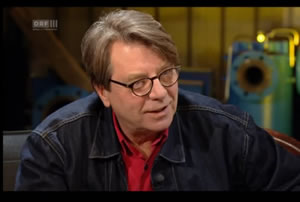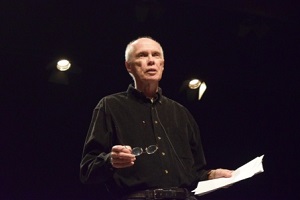De Oostenrijkse dichter en schrijver Peter Rosei werd geboren op 17 juni 1946 in Wenen. Zie ook alle tags voor Peter Rosei op dit blog.
Uit: Das große Töten
„Nachdem er diesen Schriftzug eingehend studiert hatte, als enthalte der in seiner Lakonie irgendeine verborgene oder verklausulierte Nebenbedeutung, eine Botschaft, die sich vielleicht gerade an den Betrachter jetzt richtete, senkte der Mann langsam den Kopf, so als bedenke er, was er gesehen, ging er aus der Küche, in der er gesessen war, in die anliegende Kammer hinaus und betrachtete sich im Spiegel, der da über dem Waschtisch hing: Ja – ohne Zweifel: Er sah dem Vater ähnlich!
Warum schaute er das Photo nur so gern an? Waren das nicht Dummheiten?
Langsam ging der Mann jetzt wieder in den anderen Raum, in die weiß möblierte und mit einem Kohlenherd ausgestattete Küche, und setzte sich neuerlich an den Tisch. Er überrechnete, das Bild wieder zur Hand nehmend, wie lang die Aufnahme jetzt zurücklag.
Dreißig, fünfunddreißig Jahre?
Eine kleine Weile studierte der Mann den lose fallenden Uniformrock des Vaters. – War es ein Mantel? In der Mitte war ein großer, runder Knopf, der den Kragen zusammenhielt.
Das Photo war wohl im Herbst oder Spätherbst aufgenommen. Als der Mann von draußen, vom Hof her, eine Tür, die Eingangstür gehen hörte, hängte er das Photo, das er so ausführlich betrachtet hatte, rasch an den Nagel an der Küchenwand: Dort hing das Bild alle Tage.
“Hallo, Franz!” sagte die Frau, die jetzt geschäftig in die Küche trat.
“Hallo, Mama!” sagte er, ohne indes vom Tisch aufzuschauen oder sich sonstwie freundlich zu zeigen. Die Mutter ging, ihr schwarzes Kopftuch abbindend, an den großen Kühlschrank, nahm eine Flasche Bier heraus, machte sie auf und stellte sie vor ihren Sohn hin.
“Bist frei heute?” fragte die Frau.
“Was dagegen?!” antwortete der.“

Lees verder “Peter Rosei, Kamel Daoud, Gail Jones, Ward Ruyslinck, Adriaan van der Hoop jr, Hanna Johansen, Max Dendermonde”

